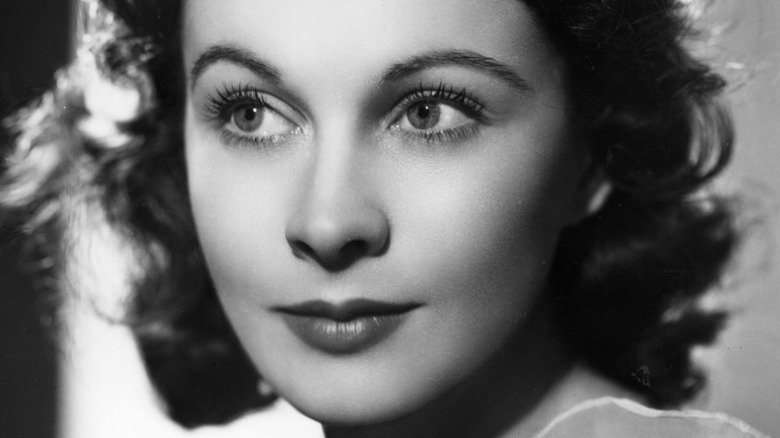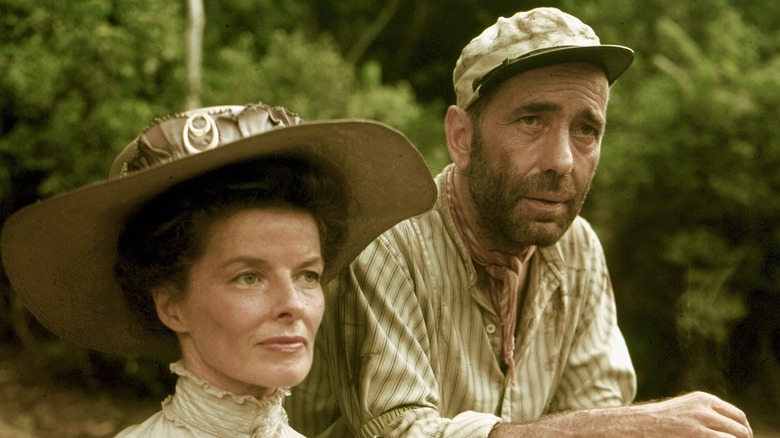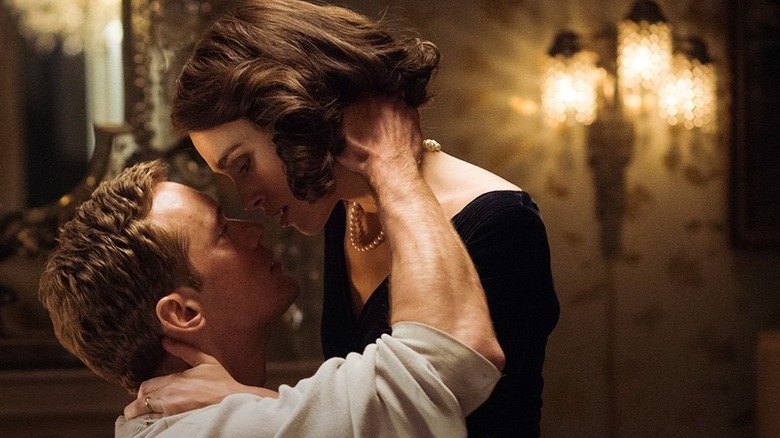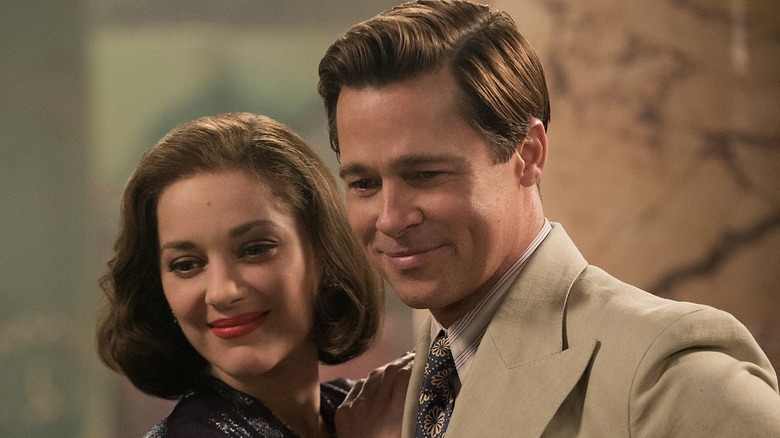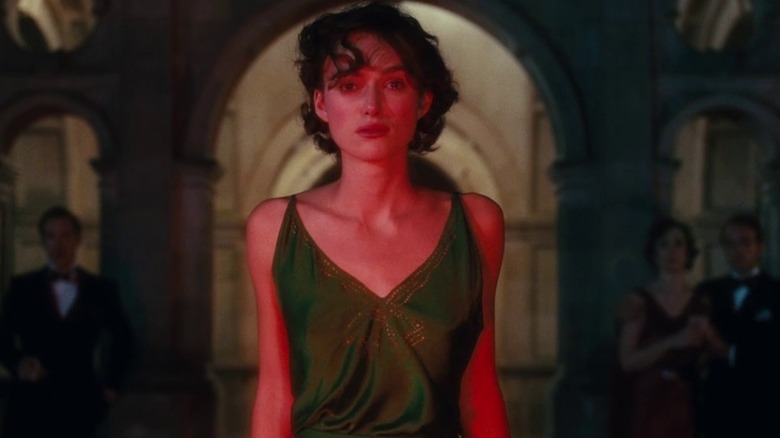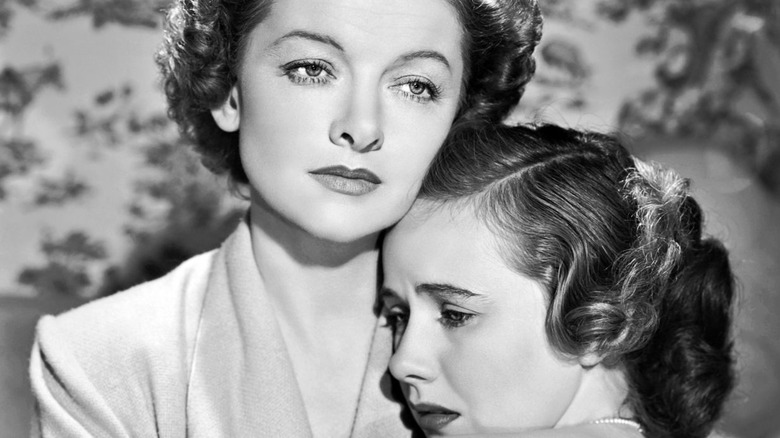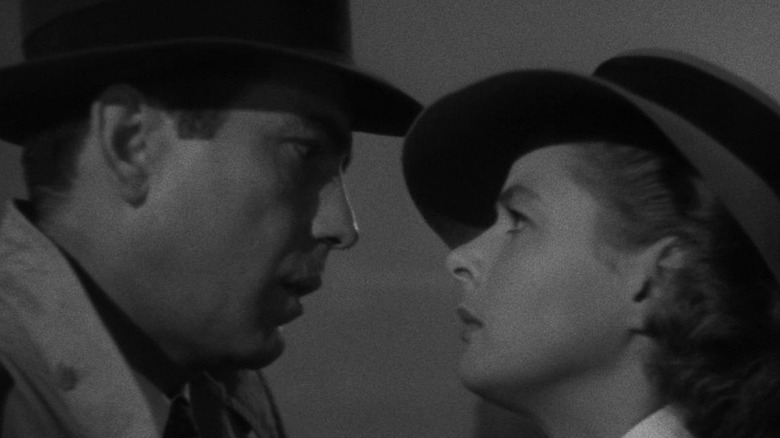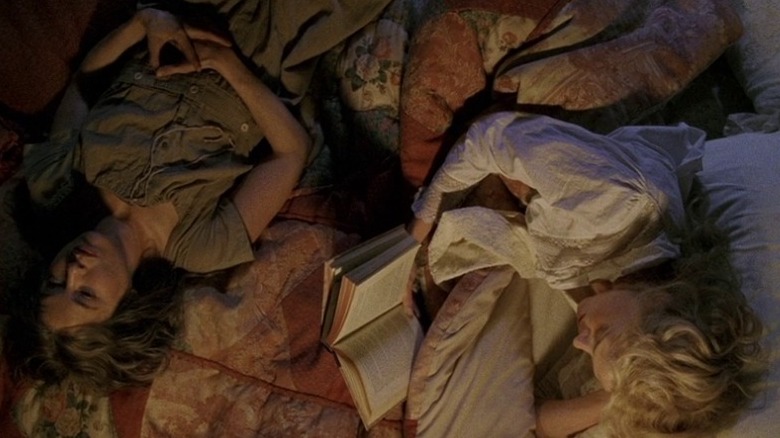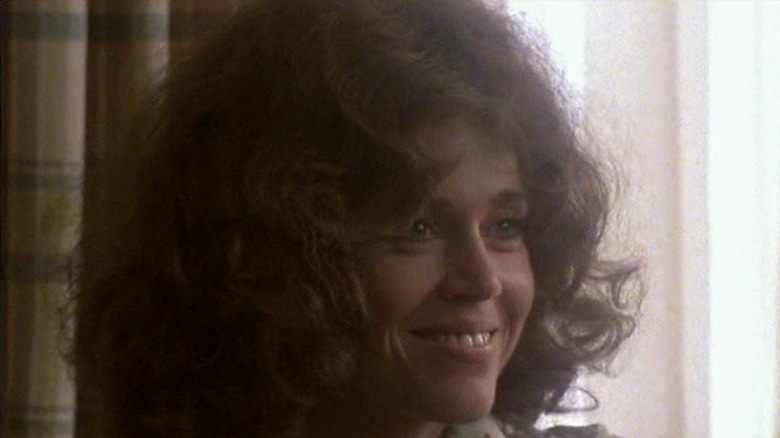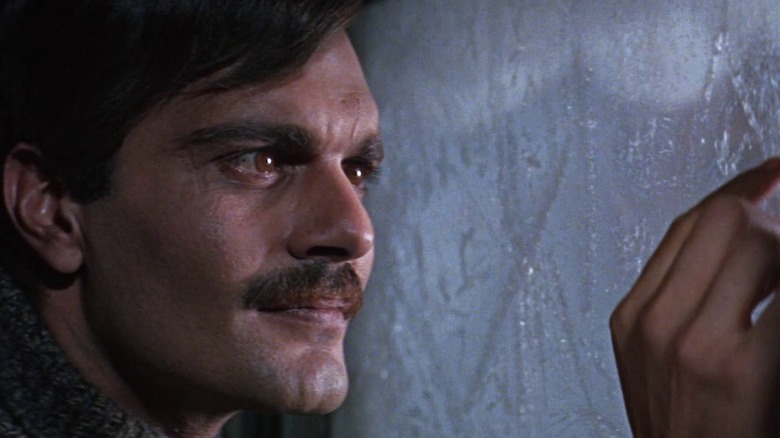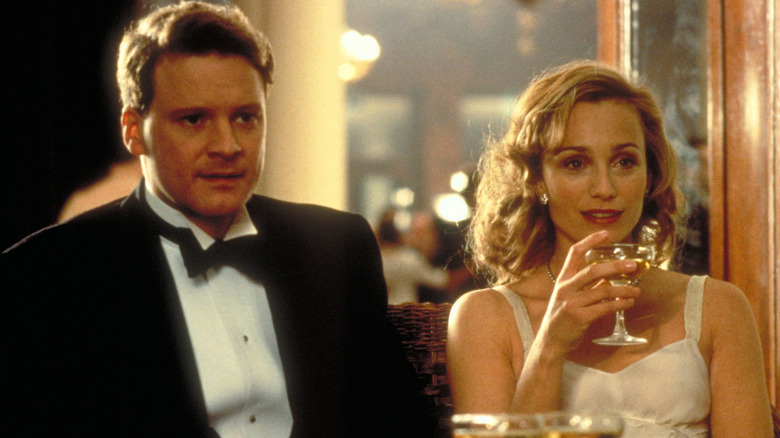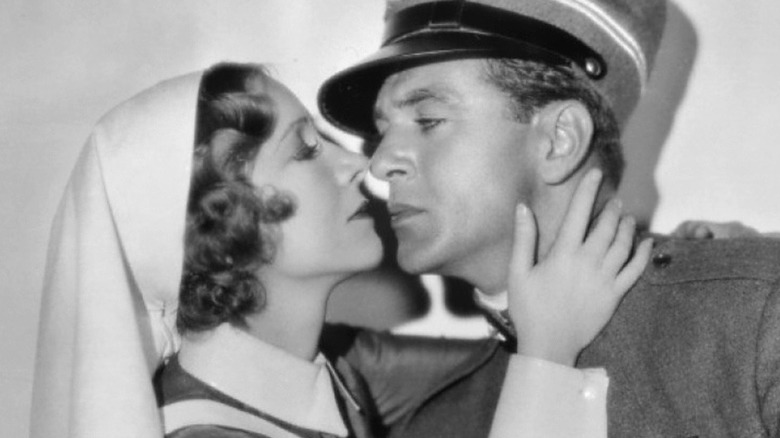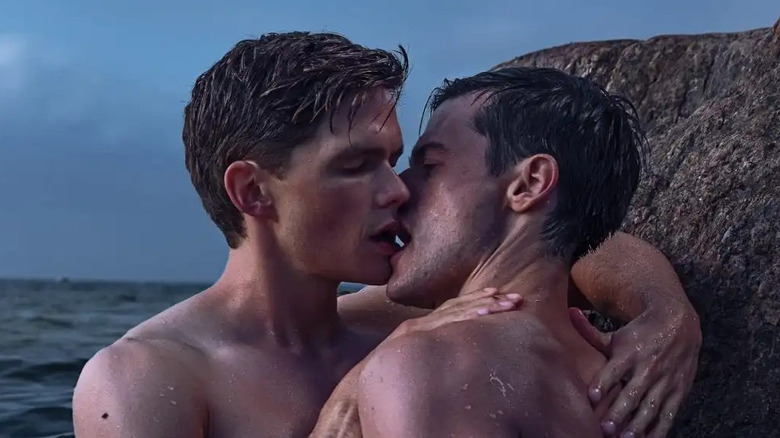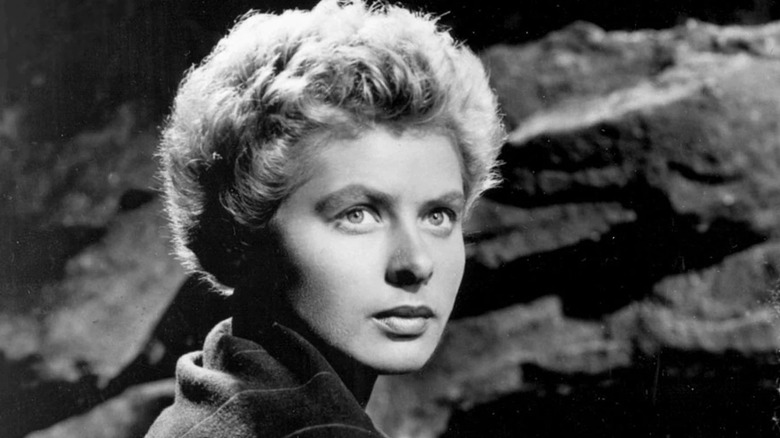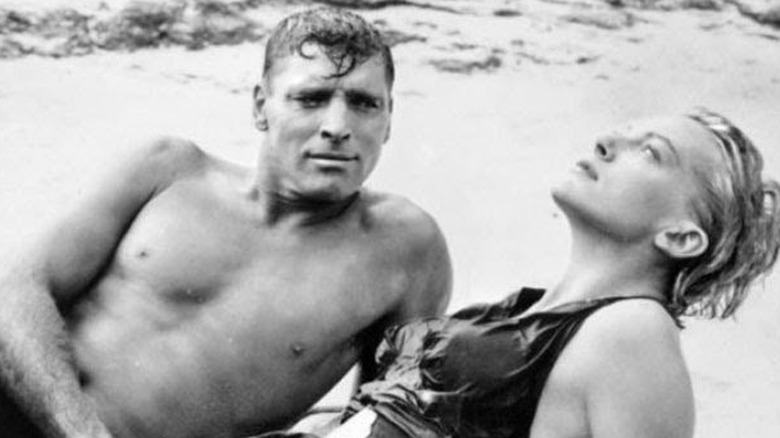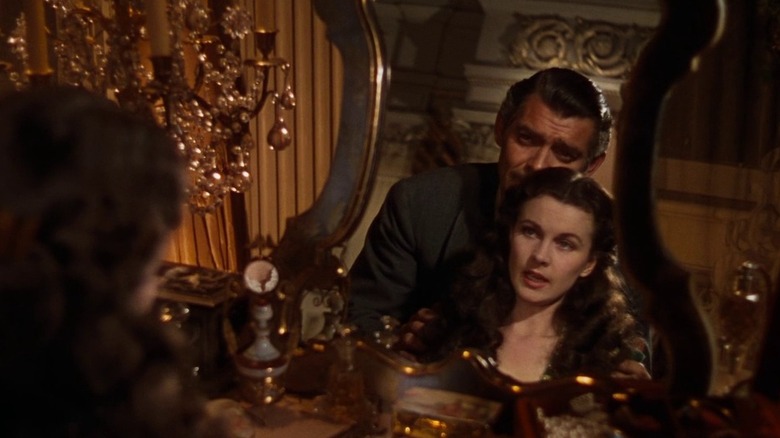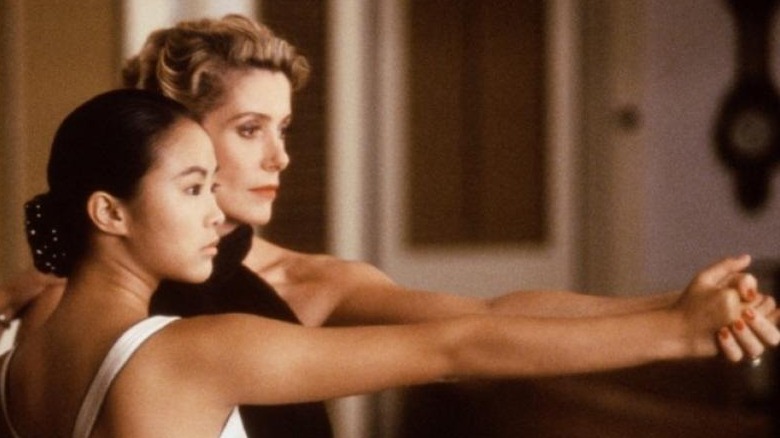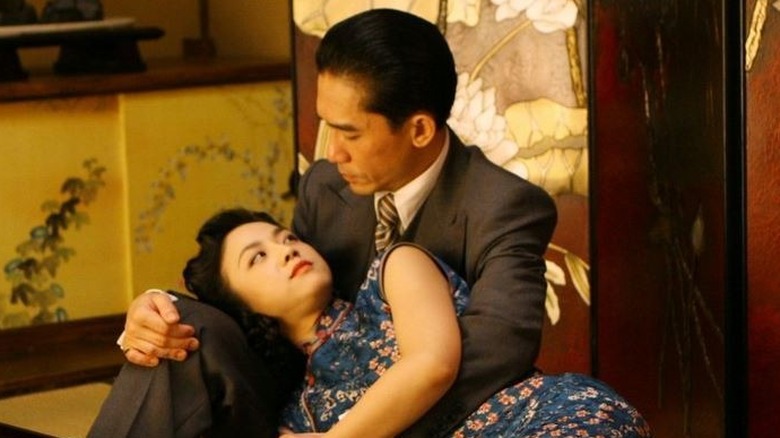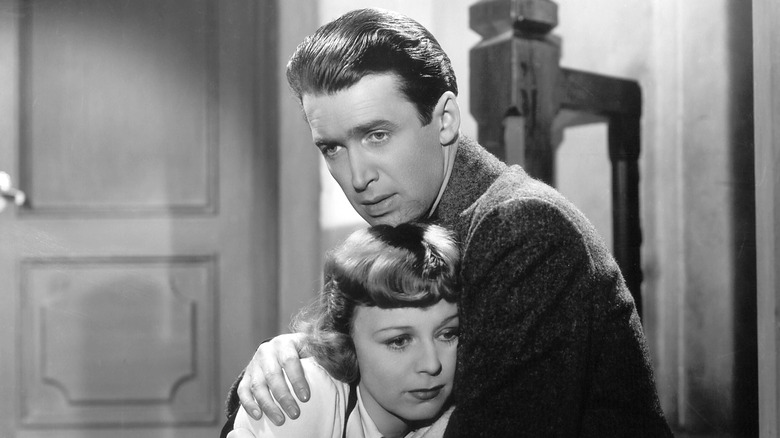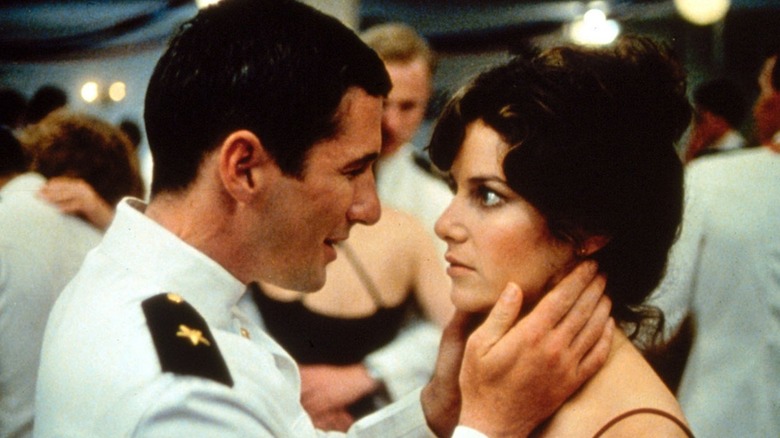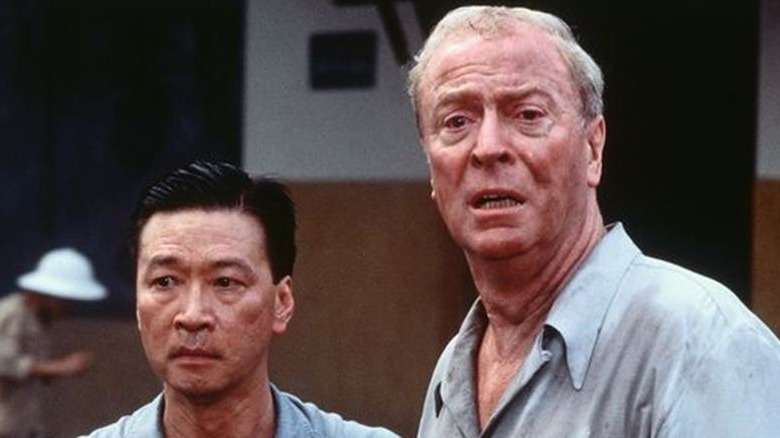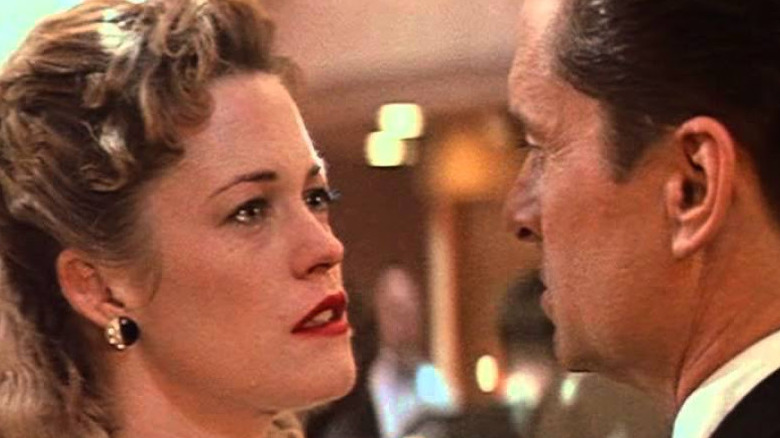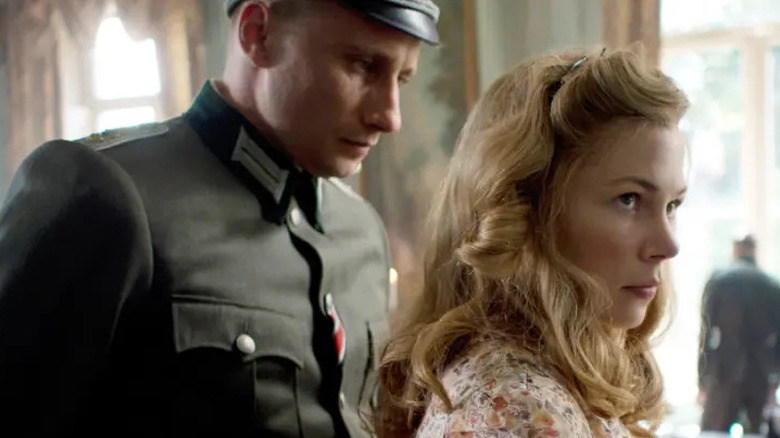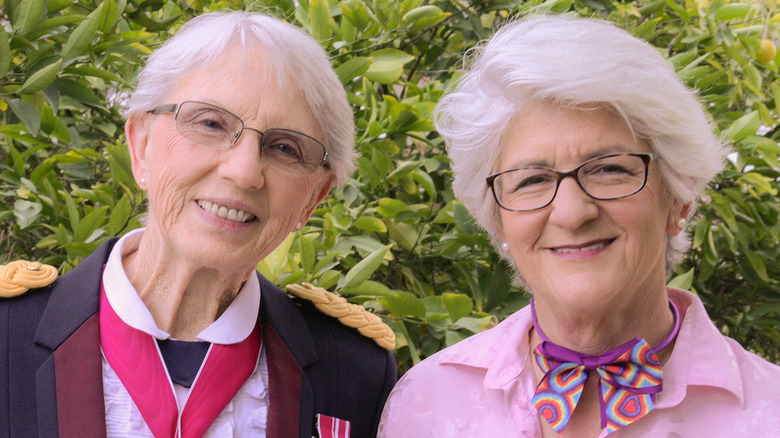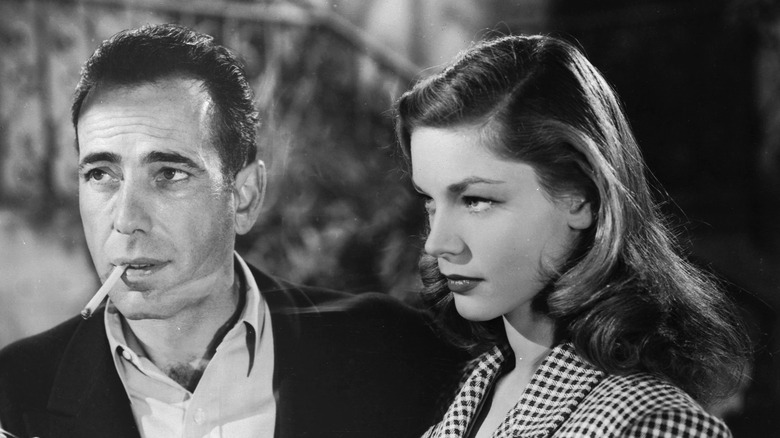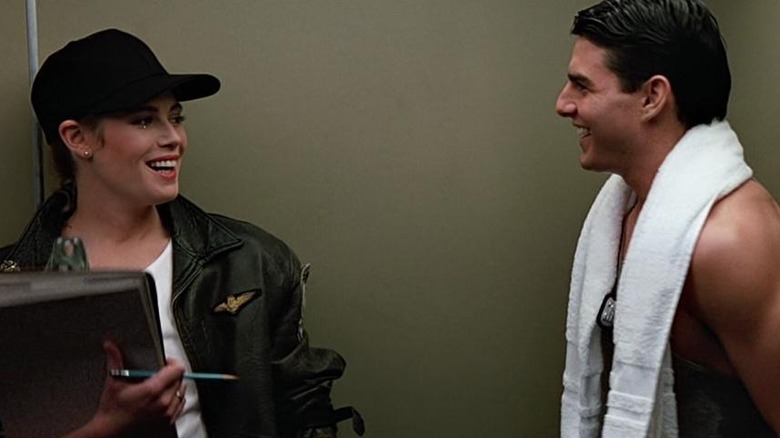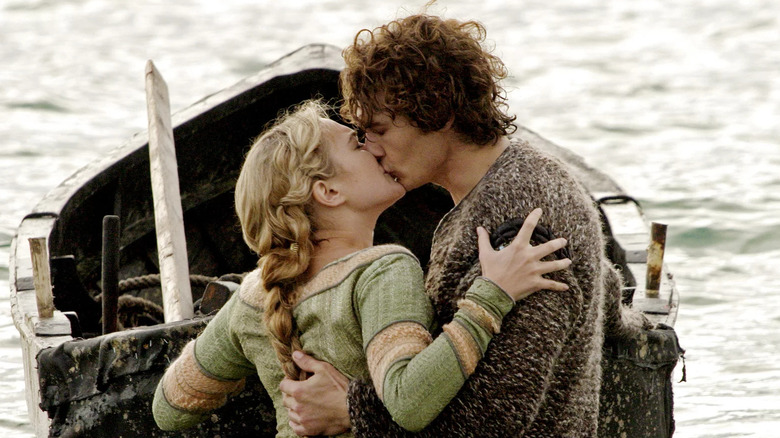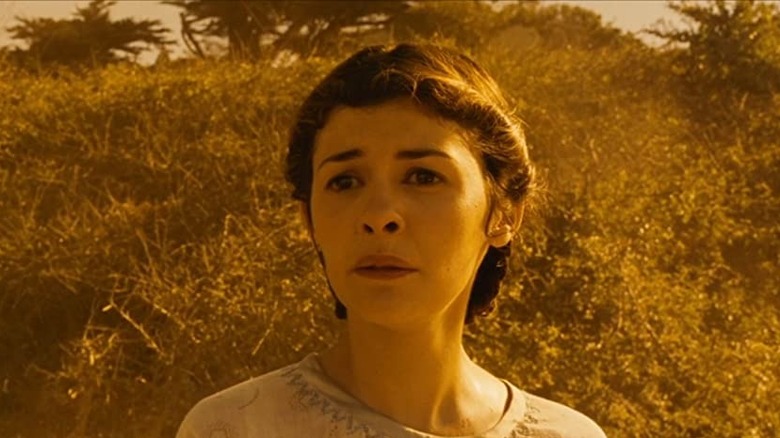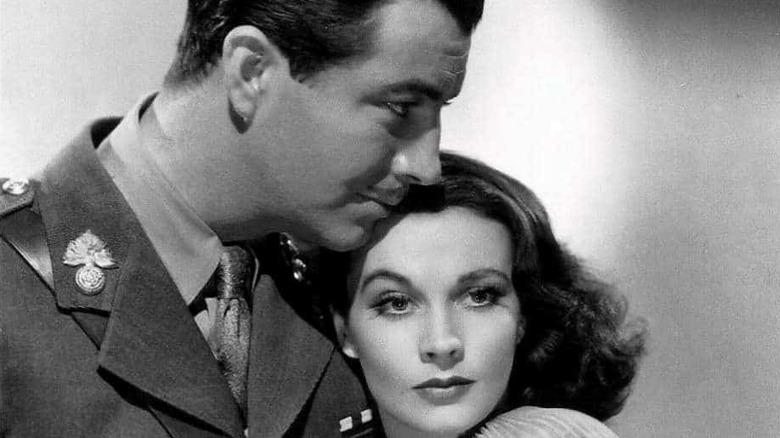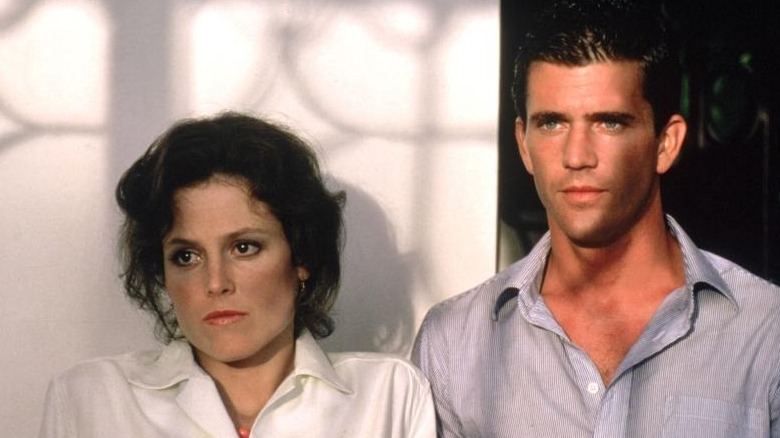30 Best Military Romance Movies To Watch Now
Few things bring out humanity's boundless capacity for love like wartime. That may sound strange, but times of strife and battle — be they on a grand or small scale — call on people to really focus on their priorities. To search within themselves for those things that mean the most, and to cherish those precious moments of happiness above all else — precisely because they are so scarce and short-lived. Perhaps that is why there is no romance like the ones set against the backdrop of war, or in a tight-knit military setting where tensions run high and passions require a fervorous outlet. As the weather turns colder and we look to cuddle up with a heartwarming, tear-jerking, emotional overload of romantic feelings, we've got just the thing. Here are some of the very best military romances out there to satisfy even your most ardent yearnings for shirtless soldiers, forbidden feelings, historic backdrops, or flirtatious banter.
The African Queen (1951)
The only collaboration between these two Hollywood heavyweights, "The African Queen" is a surprising delight on a lot of fronts. Humphrey Bogart and Katharine Hepburn are wonderful here, and their impressive compatibility deserves praise. Love stories for the middle-aged have never been a Hollywood strong suit, much less a staple, so it's delightful to see how organically it's depicted while also being a classic opposites story structure with sizzling chemistry.
Bogart is Charlie, his typical ne'er-do-well character, although this time he's one of those nasty uncultured Canadians (the horror!), while Hepburn plays a prim British missionary named Rose who, with her brother Samuel (Robert Morley), is uprooted when Germans burn their village and strike a mortal blow to Samuel. With the unlikely goal of sinking a German gunship during the early days of WWI in order to allow British troops to attack, Rose and Charlie team up. Hepburn brings all her signature well-bred moxie to the table, and Bogart is the sly blue-collar wisecracker fans love. Their friction leads to passion, and some convenient machinations lead to the defeat of the enemy and a happily ever after. What more could you want?
The Aftermath (2019)
Set in Germany after World War II, "The Aftermath" tells the story of the truly terrible idea for British soldiers stationed there to bring their wives along and take over civilian homes. Lewis Morgan (Jason Clarke) and his wife Rachael (Keira Knightley) lost their young son to the blitz, and really have no business being anywhere near Germany in their fractured state. Yet there they are, in Hamburg, occupying the home of German architect Stephen (Alexander Skarsgård), and his young teen daughter Freda (Flora Thiemann), who lost their wife and mother when the British took the city.
Unfortunately, Lewis is unable to cope with his feelings of loss and has distanced himself from Rachael, while Freda resents her father's surrendering of their home and her mother's things to the people who killed her. This unmooring of both Rachael and Stephen from their familiar, safe support systems leaves them aimless and seeking emotional sustenance. They fall into each other's arms and eventually their hearts as well. It's an underrated film — okay, technically it was eviscerated by critics — but it's beautifully shot and scored, with ardent performances by both Knightley and Skarsgård. Come for the romance, stay for the very sexy encounters, and be rewarded at the end with the imminent loss of something dear helping to break down the protective walls one's erected.
Allied (2016)
Evoking the film noir aesthetic of the movies that inspired it, "Allied" is the story of two spies during World War II whose allegiances are questioned and tested by both sides, and by each other, as their relationship deepens. Brad Pitt and Marion Cotillard star as Max and Marianne, supposed agents for the British and French allies working toward a common objective. But when Max's superior delivers counterintelligence about Marianne, who has since become Max's wife and mother to his child, Max struggles to determine if the charge is accurate or a mistake — or possibly a test of his own loyalties.
The suspense never abates in this one, and the burning questions aren't answered until the final moments. The filmmakers could have pushed the envelope even more by making Max's loyalty more ambiguous instead of putting the entire burden on Marianne's character, but it's a solid entry on the list and a fine homage to the films of the '40s.
Atonement (2007)
It's hard to argue with "Atonement's" cast of powerhouse actors, dozens of award nominations, and iconic green dress that's a sensation unto itself. It also marked the first time most Americans got a taste of Saoirse Ronan, Juno Temple, and Benedict Cumberbatch. "Atonement" further cemented the serious acting chops of Keira Knightley and James McAvoy, and is a compelling tale that draws the viewer in. A child's spitefulness mixed with a fundamental misunderstanding of events, followed by a horrific crime, leads to the separation of two lovers across time and destiny as England gets ravaged by World War II. "Atonement" pulls no punches, but miraculously these two still get their happy ending. Or do they?
Despite an overwhelming number of positive reviews, the film did receive a bit of backlash for its irresponsible handling of the adaptation of Ian McEwan's novel and the shocking reveal of an unreliable narrator at the end of the film that upends the story we've just witnessed. No longer the inspiration of love enduring against impossible odds, it becomes a self-serving fiction necessitated thanks to the love denied by injustice and cruel twists of fate. But it is hard to argue with that other stuff. Regardless, it's all worth it for that dress.
The Best Years of Our Lives (1946)
Not exactly a war drama, and not specifically a romance, "The Best Years of Our Lives" is still one of the best movies ever made. Set at the end of World War II, it follows three veterans coming home to their shared small town and trying to pick up where they left off, though they're too changed now and it's impossible to go back to who they were before the war. Released just after the end of the war – a time when most films were concerned primarily with inflating the heroism of their soldier subjects – "The Best Years of Our Lives" stood out as a film exposing the harsh realities of veterans coming home.
Focusing on three veterans in particular, the film spotlights their struggles adapting to civilian life again while being overrun with PTSD, depression, intense anger, and other stressors, long before there were even words for these conditions. Often resorting to drinking or physical altercations, all three are kept afloat by the enduring empathy of their respective love interests and the determination each woman feels that her sweetheart is not a lost cause — he's still in there, he's just protecting himself from his memories and his fears. When love comes through in the end, it feels not only uplifting but also earned. No man is an island, and it isn't a burden to accept help from the ones you love.
Casablanca (1942)
"Casablanca" is a film so etched into the firmament of Hollywood history it's almost easy to forget it's a war movie. But with action taking place within the Vichy French puppet regime, extending all the way into a colonized Morocco. Following leaders of the Czech Resistance (among other refugees) escaping from the clutches of Germany, "Casablanca" actually deals with some of the more obscure and far-reaching aspects of World War II than any other film of its era. Moreover, Rick (Humphrey Bogart) and Ilsa (Ingrid Bergman) are easily one of the top movie couples of all time, and they aren't even together as a couple except in flashbacks.
Of course, such a film could never be made today if only because Ilsa's fate is being decided solely by the men in her life at the end of the film — Victor (Paul Henreid) telling Rick to run away with her to safety since he is wanted by the Reich, Rick schooling Ilsa on why she has to get on the plane with Victor — but thankfully we don't need another film like it. We have this one, and it is nearly perfect. Ranked the number one best love story of all time by the American Film Institute (not just a war-related love story, but the best love story of kind), and the number three movie ever, how could you say otherwise?
Cold Mountain (2003)
"Cold Mountain" takes the brutality of the US Civil War and makes it personal. All wars are brutal and unforgiving, but for Americans, none is held as a greater physical, mental, and emotional challenge to our citizens than the Civil War.
In the film, Ada (Nicole Kidman) is a well-bred young lady, meaning she has been trained in art and music in preparation for an upper-crust life, but she has no practical skills. When war breaks out, her struggle exemplifies the struggles of women up and down the countryside who were left without support, without income, and without protection for years. Meanwhile, Inman (Jude Law), the shy man in love with Ada who never thought she would look his way, is sent away to fight a war that doesn't mean all that much to him, so he eventually defects. Rounded out by an insanely deep bench of talent in the supporting cast, "Cold Mountain" asks us how many perfect moments one needs in their life to make it well-lived. For some, a single moment might suffice.
Coming Home (1978)
Honing in on the devastating effects Vietnam had on the American homefront, "Coming Home" follows conservative Sally (Jane Fonda) and her life-changing experience volunteering at the local veteran's hospital. The film explores duty, self-expression, love, loyalty, and tragedy. It doesn't shy away from the truly horrible nature of PTSD, as two soldiers die by suicide after suffering its effects. It also confronts head-on the reality of soldiers returning as amputees or paraplegics — such as Sally's new love Luke (Jon Voight) — who have to somehow assimilate back into "normal" life even though society will make no concessions for them. It's a touching, heartrending film that pulls no punches and yet is unabashedly loving.
In her acceptance speech after being awarded the best actress Oscar for her role in "Coming Home," Jane Fonda incorporated signing to acknowledge the many invisible disabilities millions of Americans live with every day. A small gesture, to be sure, and one that didn't quite fit in with the themes of her film, but her heart, as ever, was in the right place.
If you or anyone you know is having suicidal thoughts, please call the National Suicide Prevention Lifeline by dialing 988 or by calling 1-800-273-TALK (8255).
Doctor Zhivago (1965)
One cannot mention epic war-torn love stories without bringing up the classic "Doctor Zhivago" starring Omar Sharif and Julie Christie as Yuri and Lara and directed by the legendary David Lean, who infuses this film with just as much sweeping cinematography as he does in "Lawrence of Arabia." Based on the landmark novel by Boris Pasternak and spanning three successive conflicts to befall the Russian people — World War I, the Bolshevik Revolution, and the Russian Civil War — the film throws our lovers together and tears them apart with the whim of a Greek god.
They are promised and then married to others, then are thrown together to witness the horrors of combat. They are separated by time and circumstance yet, again and again, are reunited by destiny and misfortune before being forced to flee for their lives. Their saga ends, as all Russian sagas must — in tragedy and death — yet there is a spark of hope that their daughter is alive. She's survived into this new Soviet era, and in this way, Yuri and Lara's love lives on without them. That's about as optimistic as Russian literature of the era gets, so run with it.
The English Patient (1996)
"The English Patient" is notorious, but unless one counts the decision to fully obscure Ralph Fiennes's face in his role as "the patient," it can't really be considered innovative. The Boston Globe — and, okay, most of the 69th Academy Awards — disagrees. The story concerns forbidden love, with László (Fiennes) and Katharine (Kristin Scott Thomas) developing shy, tentative feelings that turn to heavy passion. Separated by the onset of WWII and Katharine's (justified) fear of her husband finding out, things collapse when said husband (Colin Firth) manages to kill himself and mortally wound Katharine in a fiery plane crash intended to strike and kill László as well. And that's just the flashbacks. There's an entire secondary romance building in the film's present, between László's nurse Hana (Juliette Binoche) and bomb removal technician Kip (Naveen Andrews) which is much sweeter, purer, and more delicate.
And just for fun, there's also a mysterious search for a traitor, a seller of military secrets, led by Caravaggio (Willem Dafoe). "The English Patient" won a slew of trophies, so it's certified prestigious. And the Oscars were definitely right about awarding best supporting actress to Binoche. She's the emotional core of this gorgeously shot and directed film.
A Farewell to Arms (1932)
There are a couple adaptations of Ernest Hemingway's novel "A Farewell to Arms," but the original 1932 version was once thought lost to time due to the censorship of its ending. It features thespian powerhouses Gary Cooper and Helen Hayes in the lead roles of Frederic and Catherine and adheres closest to its source material. Both written and filmed before World War II, this story tells of the desolation and despair that engulfed people during World War I – or The Great War, as it was known then. This fatalism pervades the characters as they either press rashly into love or denounce it as a sham.
On whichever side of the divide they fall, everyone agrees there is no time to waste on social niceties or bureaucratic rules. As Hemingway himself might proclaim, act now before your chance is lost. The remastered version, created from an original nitrate copy locked in the vaults of David O. Selznick, is gorgeous to look at thanks to the Oscar-winning cinematography of Charles Lang. Lang also worked on films like "Charade," "The Ghost and Mrs. Muir," "Wait Until Dark," and "How the West Was Won," putting "A Farewell to Arms" in excellent company.
Firebird (2021)
"Firebird" is something of a unicorn. Homosexual military romances have existed since the advent of soldiers, but films with gay relationships are still a rare find. Gay romance films based on actual events that took place where homosexuality was illegal and remains illegal to this day — such as "Firebird" — are acts of bravery, plain and simple.
Another way "Firebird" stands out is by not shying away from the ambiguous feelings the lovers have for their situation. They are drawn to each other, yes, but Roman (Oleg Zagorodnii) is acutely aware of the dangers associated with engaging in an affair with another man, both as a citizen of the USSR and as a member of their military. Moreover, Roman's wife Luisa (Diana Pozharskaya) feels hurt, betrayed, and disgusted by their deception, in equal measure. She pulls no punches. Sergey (Tom Prior) and Roman's passion is filmed with ardor and acceptance, but their situation is not whitewashed with tolerance. The complications fuel the authenticity, and what results is a compelling picture.
For Whom the Bell Tolls (1943)
Hemingway had an undeniable flair for tales of love in the midst of wartime. His novel "For Whom the Bell Tolls" was turned into a film in 1943 starring Gary Cooper as Robert and Ingrid Bergman as María. Set during the Spanish Civil War, Robert and María are both fighting against the fascists of Francisco Franco in different capacities.
Robert is an American fighting with the militias of the Popular Front government, while María is a member of the local guerrilla forces. When the two factions are tasked with working together on a mission, Robert becomes instantly smitten with María. María has a tragic backstory that has robbed her of some of the innocence of her youth, but she still lacks the experience of a more worldly woman. Despite, or because of, this imbalance, her involvement with Robert leaves him invigorated as only a fresh new love affair can.
Sadly, things go awry with the mission as the two different fighting companies have conflicting ideas about the best way to go about keeping Franco's troops away, resulting in some last-second scrambling and more than one tragic sacrifice. Will the lovers live happily ever after? That was never really Hemingway's thing.
From Here to Eternity (1953)
It's impossible to say how many millions of people over the past seven decades have endured gritty, uncomfortable trysts on a beach thanks to "From Here to Eternity," but it's definitely up there. The moment Burt Lancaster and Deborah Kerr roll around in the sand and surf, so impassioned that they're unaware of the saltwater film on their skin or the crushed shells in their swimsuits, is still so enthralling to watch it's easily the most famous beach scene of any film.
The movie itself, based on the novel of the same name by James Jones, explores the languid, carefree existence of life on a Hawaiian military base in the weeks and days leading up to the Japanese attack on Pearl Harbor. It's not that the soldiers were lax, but the atmosphere was one of boxing matches, petty conflicts, and blossoming flirtations. Defenses were down, and everyone was at ease. The sharp turn in the fates of the characters after the bombings serves as a sobering reminder of the havoc and upheaval war wreaks on a life. Some of the content hasn't aged very well, but the performances remain unforgettable.
Gone With the Wind (1939)
Truth be told, there is a lot about "Gone With the Wind" that is just not okay. From the broad strokes of negative stereotypes with which it portrays Mammy (Hattie McDaniel), Prissy (Butterfly McQueen), and all the other Black characters, to the infamous implied rape scene, the movie just isn't the flawless masterpiece some people make it out to be. That said, you simply can't put the words "war," "romance," and "film" together and not think of it. It defined the sweeping saga film.
Some of its wide crane shots, ever-expanding on what appears to be miles and miles of people in a sea of carnage, are still studied and mimicked today. Scarlett O'Hara (Vivien Leigh) and Rhett Butler (Clark Gable) are one of the most enduring couples in popular culture. Rhett's "Frankly my dear ..." line has been quoted by, give or take, 50 bajillion people since the film's release in 1939.
In fact, the American Film Institute lists that quote as the number one movie quote of all time and puts two others from the film in the top 100. It also ranks the film the second-best love story, the second-best film score, one of the top 100 most inspiring films (though maybe not the way they think), and in the top 10 of the greatest American films of all time. Problematic it may be, but "Gone With the Wind" is a film of extreme cultural significance. Even its parodies are iconic.
Indochine (1992)
"Indochine" is an epic tale of Vietnam from its time as part of occupied French Indochina through the Communist uprising that would ultimately result in France's withdrawal from the continent and Vietnam's newly gained independence as separate countries North and South. Starring ethereal beauty Catherine Deneuve as Éliane, a French plantation owner outside of Saigon, "Indochine" is a rather convoluted tale. It starts with Éliane striking up an affair with a handsome naval officer named Jean-Baptiste (Vincent Perez), then falls into chaos as her adopted daughter Camille (Linh-Dan Pham) mistakenly believes they are in love when he happens to save her life. As you do.
That misunderstanding turns into real, passionate love between the two, and eventually a harrowing tale of escape and survival between them as they flee French authorities on the mainland, have a child together, and try to escape to China. Sadly, Camille is separated from her family as Jean-Baptiste and their son are apprehended by the French and the former is soon killed. Camille is eventually caught too and held for many years until the Communists come to power and she is released to join them in fighting for independence, choosing her nation over her son.
While the plot may be overwrought and overlong, the cinematography makes it all worth it, per Roger Ebert. The sweeping vistas and stunning landscapes are simply breathtaking, and no doubt contributed to the film's Oscar win for best foreign language film that year.
Lust, Caution (2007)
With a title as alluring yet opaque as "Lust, Caution," one might easily guess this is not an American feature film. And they would be correct. While director Ang Lee had great success in America up to that point with "Sense and Sensibility," "Brokeback Mountain," and even his balletic foreign language masterpiece "Crouching Tiger, Hidden Dragon," this film was very much a story that was personal and meaningful to the people of China — particularly Shanghai — but not well-known outside of it.
"Lust, Caution" is based on a novella that was based on the legend of a young woman working as a spy in Hong Kong during the Second Sino-Japanese War. She is attempting to assassinate a high-ranking government official in 1938, and again in 1942 in Shanghai where, under Japanese rule, the puppet government is executing all Chinese resistance. In this way, it's a classic thriller, with tensions high and stakes even higher. But parts of the film are pretty heavy on sexual explicitness (with one scene in particular being brutally violent), so the MPAA slapped it with the dreaded NC-17 rating. Unsurprisingly, this was a death knell for any hopes of significant traction in the states, but it still became the highest-grossing NC-17 film of all time. In the end, things don't quite work out for our femme fatale as her feelings towards her target get muddled. Emotional connections are the downfall of any espionage assassination plot. That's like science.
The Mortal Storm (1940)
The original theatrical trailer for "The Mortal Storm" is an oddity, because it goes out of its way to not reveal any details of the film, rather directing the audience to the novel on which the film is based, saying it has to be seen to be appreciated. Furthermore, it makes the astounding decision to quote reviews of the book, such as that from the New York Herald Tribune, calling it a "beautiful young love story," referring to the lovely Freya (Margaret Sullivan) rejecting the man she was supposed to marry when he goes in with the Reich, turning instead to the loving, righteous arms of Martin (Jimmy Stewart).
That same review, according to Turner Classic Movies, lamented the dated feeling of a movie that dealt with events that were still shocking and weighty when production began but old news by the time the film was released to theaters. It's true, news cycles in times of war and conflict move much faster than that of the Hollywood studio system, so it's no wonder audiences were rather lukewarm to it at the time. However, eight decades later "The Mortal Storm" has a 100% Fresh rating from critics on Rotten Tomatoes. The film was so effective in its critique of Nazism that it prompted Joseph Goebbels to ban it and every further MGM film from distribution throughout Germany and its occupied territories. Now that's an impact.
An Officer and a Gentleman (1982)
When it comes to military romance films, there are lots of places to go for a satisfying one, but "An Officer and a Gentleman" is one for the ages. From Zack Mayo (Richard Gere) sputtering about his lack of available avenues to Sgt. Foley (Lou Gossett Jr.) being the most intimidating, motivating, the best damn thing you've ever seen (even with points off for the homophobic slur), the film has it all. Then there's the closing shot of Paula (Debra Winger) in Mayo's arms with his hat on her head as Lynette (Lisa Blount) shouts "Way to go, Paula" in the twangiest accent anyone has ever heard in Washington state. Throw in the film's theme song, "Up Where We Belong" swelling in the background, and the movie is chock-full of indelible moments.
It also perfectly balances the story between the difficult military training Zack and his fellow candidates are undergoing and the tentative passions of two people who are drawn to one another but don't know if they can trust their own feelings, much less each other. The film also looks at the weight of expectations, disappointments, and the power of simple encouragement. Ranked by AFI as the 29th best love story of all time, "An Officer and a Gentleman" really hits the spot.
Omar (2013)
Set amid the strained landscape of the West Bank, "Omar" is a Palestinian film about the sheer impossibility of living in this environment and not having it inform your whole existence. For the film, this message manifests in the life of the titular character, played by Adam Bakri, Nadia (Leem Lubany), the girl he loves, and the lives of his friends Tarek and Amjad (Eyad Hourani and Samer Bisharat, respectively).
The boys start out as inseparable as brothers, but when Omar is caught crossing the wall along the West Bank to visit Nadia, a domino effect of hardships envelops the foursome. They enter an endless exchange of blows and retaliations between themselves and the Israeli guards across the way. The boys wind up fighting as much against one another as they do the soldiers, as all of their identities and the trust they had built within their friendship and their community have been compromised. All Omar has left is his love for Nadia, but she might be lost forever too. "Omar" is a bittersweet love story set against tragedy in a war-torn region.
The Quiet American (2002)
Is it truly possible to be an uninvolved observer? That's the question "The Quiet American" explores over the course of its 101-minute running time.
Michael Caine plays journalist Thomas Fowler, stationed in Saigon during the First Indochina War, between the occupying French and the forces originally led by Ho Chi Minh before the American involvement in the Vietnam Conflict. Thomas likes to claim no bias, as it would impinge on his journalistic integrity. However, when it comes to his mistress Phuong (Thi Hai Yen Do), the interference of secret CIA operative Alden Pyle (Brendan Fraser), and some not-so-coincidental bombings being blamed on "the Communists," it turns out Thomas does have opinions that sway him irrevocably to one side of the growing tensions that will eventually lead directly to America's deadly and fruitless interference in the country. His opinions, much to his own horror, come to bear in the film, and they have consequences too.
This is the price one pays for living in the world, though. As his assistant Hinh (Tzi Ma) tells Thomas "sooner or later, Mr. Fowler, one has to take sides." Take sides he does, with one single action that changes the fates of all involved. A bit harsh, perhaps, but all's fair in love and war.
Shining Through (1992)
One of Melanie Griffith's best assets is her pluckiness, and "Shining Through" rests a lot of its appeal on it. Griffith plays Linda Voss, an Irish-Jewish daughter of immigrants living in Queens in the 1930s and '40s. She is soft-spoken but assertive and unafraid to voice her opinions.
While job hunting has her batting up against young women with degrees from places like the Seven Sisters colleges, she stumbles into a position as the private secretary of a mysterious man named Ed Leland (Michael Douglas), whom she's instantly drawn to. With war already raging in Europe, however, and tensions building in America, Linda soon discovers the company she works for is a front and Ed is a spy. The two begin a romance but it falls apart once the US enters the war in December 1941.
As events unfold, Linda uses her sheer force of will and that unflagging pluck to land herself a spy mission in Berlin, where the help and hindrance of characters played by gifted actors John Gielgud, Joely Richardson, and Liam Neeson leads her into a deadly battle and back into Ed's arms. Critics, for the most part, didn't like this level of melodrama, giving it a Rotten Tomatoes score of just 41%, but the audience score is nearly twice that. Pluck and common charm, it seems, are valuable assets indeed.
Suite Française (2015)
"Suite Française," a film based on a novel found and published 60 years after it was written, refers to a piece of music composed by the Nazi lieutenant Bruno von Falk (Matthias Schoenaerts). He's assigned to stay in the home of Madame Angellier (Kristin Scott Thomas) and her daughter-in-law Lucile (Michelle Williams, who dedicated her performance to the book's author) as troops temporarily camp in their small town during the German occupation of France in World War II.
Bruno was a composer before circumstances dictated he join the ranks of the German army, and he senses a kindred spirit in Lucile, who is meek and cowed under the thumb of her deployed husband's mother, but who has a deep sense of justice and compassion. Lucile is lonely and ostracized in town because of Madame Angellier's ruthless attitude and reputation.
Hostilities and tensions arise as everyone struggles with conflicting attitudes towards these uninvited guests. Lucile discovers it's not as easy as one may wish to set aside all the cares and problems of everyone else and live in a private bubble of romanticism. They are caught in desperate times, and she acts accordingly. The fairytale she wants is not possible, and many things are left unsaid, but the feelings were very real.
Surviving the Silence (2020)
Can a documentary be romantic? According to "Surviving the Silence" director Cindy L. Abel, romance is the very heart of this story and what drew her into it. The original story involved the events surrounding the military discharge of Colonel Margarethe Cammermeyer after she disclosed she was a lesbian to a security clearance council, as depicted in the 1995 TV movie "Serving in Silence" starring Glenn Close.
The lead member of the council investigating Cammermeyer's case, it turns out, was army nurse Colonel Pat Thompson, also a lesbian living in secret under the supposed tolerance of don't ask don't tell. Her story of a lifetime hiding who she was from almost everyone, as it crashes up against her forced complicity in Cammermeyer's ouster, is where "Surviving the Silence" takes the reins. The care and caution both Pat and her eventual wife Barbara had to take, not knowing who might discover their secret, be it a neighbor or a coworker or someone listening in on a phone call, is incredibly moving. Through it all, it's their love that drives them forward, that keeps them going, and that ultimately leads Pat to find a way to perform her duty while also doing right by Colonel Cammermeyer.
To Have and Have Not (1944)
One of the most iconic films of its era, "To Have and Have Not" is the film that gave us Humphrey Bogart and Lauren Bacall for the first time, already crackling with the chemistry that would make them one of Hollywood's hottest couples of all time, and the oft-repeated line, "You know how to whistle, don't you Steve? You just put your lips together and ... blow."
Following the success of "Casablanca," Bogart is back in another French colony — this time Martinique — once again caught between the puppet Vichy French government and the French resistance during the Nazi occupation of France in the early 1940s. He's as compelling onscreen as ever, though that may be due to his costar. Bacall sizzles on the screen as Slim, a cunning thief and sly observer of Harry's (Bogart) predicaments. What makes it unforgettable is the relationship between the two leads, and audiences are just lucky enough that putting Bogie and Bacall together in a movie was like harnessing lightning in a bottle.
Top Gun (1986)
There are a few love stories of note in the 1986 phenomenon "Top Gun." First, there's Pete "Maverick" Mitchell (Tom Cruise) wooing Charlie (Kelly McGillis) from those first off-key strains of "You've Lost That Lovin' Feeling." Second, there is the absolute top-shelf relationship goals marriage of Goose (Anthony Edwards) and Carole (Meg Ryan), honed down to its quintessential essence in one perfect single scene.
Thirdly, and perhaps most indelibly, there is the volleyball scene that opened up an entire generation of young teens to their sexuality. "Homoerotic" is not nearly sufficient enough of a word to describe it, as Dave Holmes wrote for Esquire prior to the summer release of the sequel "Top Gun: Maverick," if for no other reason than it connotes merely a suggestion of homosexual desire, whereas Holmes argues the intention is blatant. Turns out he's not wrong. Even late director Tony Scott said of the scene, "I didn't have a vision of what I was doing other than just doing soft porn."
It must be noted, too, girls saw also "Top Gun" in droves. And if those girls liked boys, they liked that scene. It was an honest-to-god cultural touchstone moment for just about anyone at a formative age in 1986, because suddenly in the middle of a crowded movie theater, they all, en masse, found that loving feeling.
Tristan & Isolde (2006)
Adapted from a medieval legend, "Tristan & Isolde" is a tale of the warring tribes and clans of the British Isles before the reign of English kings that began with William the Conqueror. Tristan (James Franco) is an orphan taken in by Marke (Rufus Sewell), Lord of Cornwall. He grows and is raised like Marke's son, and learns to become a warrior. During a battle, Tristan is believed dead and his body is sent to sea on a raft, where it lands on the shores of Ireland. Isolde (Sophia Myles) finds him and discovers he is still alive. As she nurses him back to health, they fall in love.
Complications arise, born out of questions of divided loyalties, true love, and honor, that will test Tristan, Isolde, and Marke to their very limits. Michael Booth of The Denver Post applauded the film for taking the tale of star-crossed lovers away from the likes of Romeo and Juliet and Lancelot and Guinevere, giving what can be familiar notes in a story feel somewhat fresh and new. He also applauded the performances of the central trio, particularly Sewell, of whom he wrote, "his eyes burn with both fury and love, and if anyone sells this tale of competing loyalties, he does."
A Very Long Engagement (2004)
Set during World War I, "A Very Long Engagement" is the story of two affianced lovers separated by the battlefield, then kept apart even longer as Manech (Gaspard Ulliel) is presumed dead following a brutal punishment by the French government for trying to be sent home and Mathilde (Audrey Tautou) searches for the answers as to what happened to him and his fellow soldiers.
The sweeping landscapes provide some breathtaking cinematography, and lush warm hues enrich the atmosphere of everything they touch, prompting critic Richard Roeper to say, "Visually it is one of the most impressive films of the year." That stunning beauty may seem fitting for the typical emotional resonance of an epic war romance, and rightly so.
The film is not all grand emotional melodrama, however. Mixing the soaring emotions of a love story amid the horrors of war with whimsy both fanciful and dark, "A Very Long Engagement" becomes something more than its parts. David Edelstein at Slate said "It gave the feeling of a macabre fable," and that director Jean-Pierre Jeunet "is lyrical even when gliding through vast, infernal trenches, past hideously mutilated bodies." That sounds like an engagement worth committing to.
Waterloo Bridge (1940)
Told in flashback, the story of "Waterloo Bridge" starts off as the story of a meet-cute during a World War II air raid, as Myra (Vivien Leigh) and Roy (Robert Taylor) are both crossing the titular bridge as the raid begins and the pair happen to take shelter together. As so often happens in these older tales of love found in wartime, it's a whirlwind romance that starts with meeting for the first time one day and deciding to get married the next, but a testament to the acting chops of both Leigh and Taylor that the love affair feels so genuine — receiving overwhelmingly positive feedback from audiences and critics alike.
The original 1940 review in The New York Times, in fact, is largely a tribute to the talents of Ms. Leigh, calling her one of the best actresses of the time, saying that her deftness in transitioning her character from one of wide-eyed innocence to one of hopelessness in itself made the film more substantive. The tale is of course bittersweet, as it plays with tropes of missed connections that plague all star-crossed lovers. But like all the most compelling star-crossed lovers of history, the love still looms large between them, across distance, years, and even death.
The Year of Living Dangerously (1982)
"The Year of Living Dangerously" is perhaps best remembered as the film Linda Hunt won the best supporting actress Oscar for her role playing a man – albeit a role with "layers of sexual ambiguity," per a 1986 BOMB interview. The film follows novice reporter Guy Hamilton (Mel Gibson) and UK Embassy worker Jill Bryant (Sigourney Weaver) taking place during a real-life military coup of the Indonesian government in 1965.
When Guy arrives still wet behind the ears, it's only the proffered friendship of photographer Billy Kwan (Hunt) that gets him any contacts in Indonesia whatsoever. It's also through Billy that Guy and Jill meet and become romantically involved. As military tensions rise and all evidence points to a coming rebellion, the need to flee Jakarta is obvious. Billy is killed, however, and Guy's ambition leads him to want to stay to cover the rebellion. He gets caught in a melee at the presidential palace and suffers a serious eye injury. Only as he's recuperating at the home of his late friend does he realize his judgment has been clouded by all the wrong things, and what's important is being with Jill.
